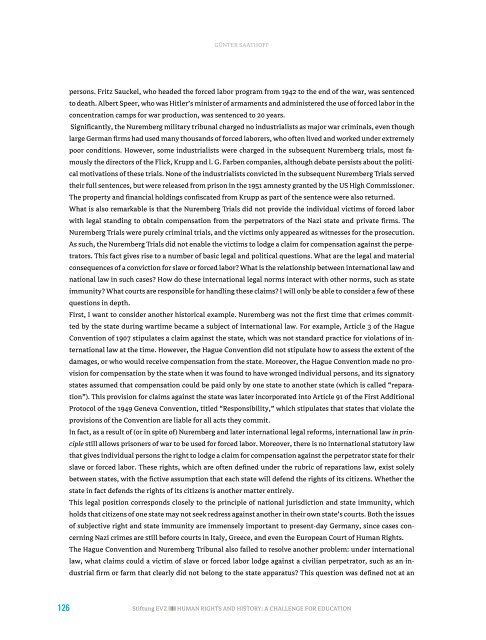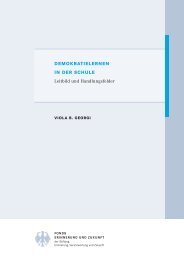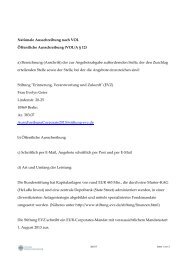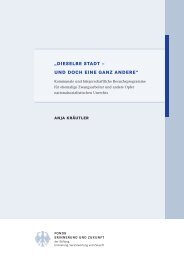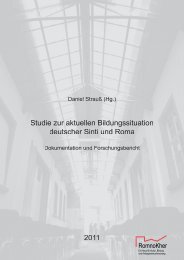chapter 2 - Stiftung "Erinnerung, Verantwortung und Zukunft"
chapter 2 - Stiftung "Erinnerung, Verantwortung und Zukunft"
chapter 2 - Stiftung "Erinnerung, Verantwortung und Zukunft"
Create successful ePaper yourself
Turn your PDF publications into a flip-book with our unique Google optimized e-Paper software.
Günter Saathoff<br />
persons. Fritz Sauckel, who headed the forced labor program from 1942 to the end of the war, was sentenced<br />
to death. Albert Speer, who was Hitler’s minister of armaments and administered the use of forced labor in the<br />
concentration camps for war production, was sentenced to 20 years.<br />
Significantly, the Nuremberg military tribunal charged no industrialists as major war criminals, even though<br />
large German firms had used many thousands of forced laborers, who often lived and worked <strong>und</strong>er extremely<br />
poor conditions. However, some industrialists were charged in the subsequent Nuremberg trials, most famously<br />
the directors of the Flick, Krupp and I. G. Farben companies, although debate persists about the political<br />
motivations of these trials. None of the industrialists convicted in the subsequent Nuremberg Trials served<br />
their full sentences, but were released from prison in the 1951 amnesty granted by the US High Commissioner.<br />
The property and financial holdings confiscated from Krupp as part of the sentence were also returned.<br />
What is also remarkable is that the Nuremberg Trials did not provide the individual victims of forced labor<br />
with legal standing to obtain compensation from the perpetrators of the Nazi state and private firms. The<br />
Nuremberg Trials were purely criminal trials, and the victims only appeared as witnesses for the prosecution.<br />
As such, the Nuremberg Trials did not enable the victims to lodge a claim for compensation against the perpetrators.<br />
This fact gives rise to a number of basic legal and political questions. What are the legal and material<br />
consequences of a conviction for slave or forced labor? What is the relationship between international law and<br />
national law in such cases? How do these international legal norms interact with other norms, such as state<br />
immunity? What courts are responsible for handling these claims? I will only be able to consider a few of these<br />
questions in depth.<br />
First, I want to consider another historical example. Nuremberg was not the first time that crimes committed<br />
by the state during wartime became a subject of international law. For example, Article 3 of the Hague<br />
Convention of 1907 stipulates a claim against the state, which was not standard practice for violations of international<br />
law at the time. However, the Hague Convention did not stipulate how to assess the extent of the<br />
damages, or who would receive compensation from the state. Moreover, the Hague Convention made no provision<br />
for compensation by the state when it was fo<strong>und</strong> to have wronged individual persons, and its signatory<br />
states assumed that compensation could be paid only by one state to another state (which is called “reparation”).<br />
This provision for claims against the state was later incorporated into Article 91 of the First Additional<br />
Protocol of the 1949 Geneva Convention, titled “Responsibility,” which stipulates that states that violate the<br />
provisions of the Convention are liable for all acts they commit.<br />
In fact, as a result of (or in spite of) Nuremberg and later international legal reforms, international law in principle<br />
still allows prisoners of war to be used for forced labor. Moreover, there is no international statutory law<br />
that gives individual persons the right to lodge a claim for compensation against the perpetrator state for their<br />
slave or forced labor. These rights, which are often defined <strong>und</strong>er the rubric of reparations law, exist solely<br />
between states, with the fictive assumption that each state will defend the rights of its citizens. Whether the<br />
state in fact defends the rights of its citizens is another matter entirely.<br />
This legal position corresponds closely to the principle of national jurisdiction and state immunity, which<br />
holds that citizens of one state may not seek redress against another in their own state’s courts. Both the issues<br />
of subjective right and state immunity are immensely important to present-day Germany, since cases concerning<br />
Nazi crimes are still before courts in Italy, Greece, and even the European Court of Human Rights.<br />
The Hague Convention and Nuremberg Tribunal also failed to resolve another problem: <strong>und</strong>er international<br />
law, what claims could a victim of slave or forced labor lodge against a civilian perpetrator, such as an industrial<br />
firm or farm that clearly did not belong to the state apparatus? This question was defined not at an<br />
126<br />
<strong>Stiftung</strong> EVZ<br />
HUMAN RIGHTS AND HISTORY: A CHALLENGE FOR EDUCATION


